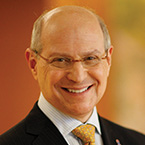
For his vast contributions to breast cancer management and clinical cancer research, and for constructing mathematical models to predict tumor growth based on Gompertzian growth kinetics, leading to improved understanding of the functional relationship between chemotherapeutic dose, tumor size, treatment sensitivity, and dose schedule.
A prominent authority and leader, Dr. Norton is recognized for his innovative approaches to using mathematical models to understand cancer development and metastasis in an attempt to impact clinical care and improve disease management. Intrigued by the rapid recurrence of a lymphoma patients’ tumor, Dr. Norton worked with Dr. Richard Simon to construct a mathematical model to predict tumor growth based on Gompertzian growth kinetics that follow an S-shape curve where tumor growth rates increase with size until a plateau is reached. The Norton-Simon hypothesis, revolutionary at the time, defied the then established understanding of tumor growth and proposed that the rate of tumor shrinkage is proportional to the rate of tumor growth, leading to an alternative “dose-dense” treatment plan involving the delivery of the same drug dose at an increased frequency. This work would lead to the further understanding of the functional relationship between chemotherapy dose, tumor size, treatment sensitivity and dose schedule. Dr. Norton would later also design and lead clinical trials that demonstrated the superiority of sequential and dose-dense chemotherapy in breast cancer patients.
Recently, Dr. Norton’s research has focused on cancer metastasis and, with Dr. Joan Massagué, has defined the concept of tumoral “self-seeding,” demonstrating that cancers self-seed from circulating cells capable of stimulating metastasis prior to returning to a primary tumor site. Conducting studies in mice, they identified four genes critical for this process: IL-6 and IL-8 recruit circulating tumor cells to the primary site and FSCN1 and MMP1 mediate the infiltration into the primary tumor. This model explains not only metastasis to distant sites but also enhanced regrowth of tumors at primary tumor sites following initial tumor resection. In addition to his significant research contributions, Dr. Norton has led several national initiatives such as the Breast Cancer Research Foundation (BCRF) and was a US Presidential appointee to the National Cancer Advisory Board.
Career Highlights
2018 Double Helix Medal, Cold Spring Harbor Laboratory
2018 David Dubinsky Humanitarian Award, American Friends of Soroka Medical Center
2014 Physicians and Surgeons Alumni Association’s Gold Medal for Outstanding Achievement in Medical Research, Columbia University
2013 Gianni Bonadonna Breast Cancer Award, American Society of Clinical Oncology
2013 Willet F. Whitmore Award for Clinical Excellence, Memorial Sloan Kettering Cancer Center
2011 Award for Medicine, Hope Funds for Cancer Research
2010 Clinical Excellence Award, Castle Connolly Medical Ltd
2008 William L. McGuire Memorial Lecture Award, San Antonio Breast Cancer Symposium
2006 Jeffrey A. Gottlieb Memorial Award, University of Texas MD Anderson Cancer Center
2005 Herbert & Maxine Block Memorial Lectureship Award for Distinguished Achievement in Cancer, Ohio State Comprehensive Cancer Center
2004 Brinker Award for Scientific Distinction, Susan G. Komen®
2004 David A. Karnofsky Memorial Award and Lecture, American Society of Clinical Oncology
2003 II Premio Internacional de Oncología Duque de Badajoz, La Fundación para la Investigación y Formación en Oncología, Badajoz, Spain
2000 Claude Jacquillat Award for Achievement in Clinical Oncology, France
1990 American-Italian Cancer Foundation Prize for Scientific Excellence in Medicine